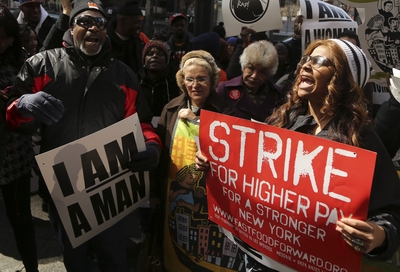
A fledgling movement for better pay for fast-food and other poorly paid employees is hoping for a major boost next week when thousands of low-wage workers are expected to walk off their jobs in seven cities across the country.
On Monday, workers are planning to stage one-day strikes at some of the nation's best known and most profitable fast-food restaurants, including KFC, Wendy's, Burger King and McDonalds.
The aim of the protests, which have been expanding for much of the year, is to force employers to raise the low pay that is typical of jobs in one of the most rapidly growing sectors of the nation's labor market. The protesters are demanding a living wage of $15 an hour.
The walkouts are scheduled to take place in five cities where workers have previously protested: Detroit, New York, Milwaukee, Chicago and St. Louis. Those workers will be joined by fast-food employees in Flint, Mich., and Kansas City, Mo. Organizers said low-wage employees at stores including Dollar Tree, Macy's and Victoria's Secret are expected to join protesters in several cities.
The protests are backed by a network of community, clergy and labor groups across the country, including the Service Employees International Union.
"SEIU members, like all service-sector workers, are worse off when large fast-food and retail companies are able to hold down wages and push down benefit standards for working people," said Mary Kay Henry, SEIU president.
Workers planning to take part
in the one-day strikes say they have little to lose. Robert Wilson, 25, who works at a McDonald's in downtown Chicago, said he makes only $8.60 a hour after seven years on the job. He said a previous walkout in April earned workers some "small victories," including more hours and small raises.
"I'm not really concerned about losing my job," Wilson said. "If I don't do anything, I am in a lose-lose situation. I can still get fired at any time."
Protest supporters say the job actions have broad implications for the nation's work market. Employers have been adding low-wage jobs at a relatively rapid clip in the wake of a recession that wiped out many middle-income jobs available to people with few educational credentials.
Moreover, federal researchers project that seven of the 10 fastest-growing jobs over the next decade will be low-wage positions, such as store clerks, laborers and home health aides.
If wages for American workers are to increase after being flat for more than a decade, jobs now accepted as low-wage will have to pay dramatically better, supporters of the job actions say.
Representatives of the fast-food industry counter that most restaurants operate on meager profit margins, while providing an opportunity for large numbers of people to enter the workforce, while giving them the chance to move up.
The National Employment Law Project released a report Thursday refuting part of that assertion. Fewer than one in 50 jobs in fast-food restaurants are managerial, the study said. Meanwhile, becoming a franchise owner takes the better part of $1 million in some cases, putting that option out of reach for the vast majority of workers.
Moreover, many employers with a large number of low-wage workers object to the idea of paying dramatically higher wages. Earlier this month, retail giant Wal-Mart threatened to freeze plans to build three stores in Washington and reevaluate three stores already under construction after the D.C. City Council passed a bill requiring large retailers to pay its workers a "living wage" of at least $12.50 an hour.





